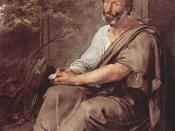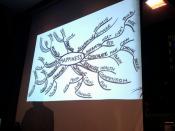Aristotle and The Human Good
In book I, Nichomachean Ethics Aristotle argues the highest end is the human good, and claims that the highest end pursued in action is happiness, "What is the highest of all goods pursued in action...most people virtually agree, since both the many and the cultivated call it happiness"(pg. 198 ll.1095a 15-20). Aristotle's argument is flawed when he suggests only human beings with full use of reason (not animals or even small children) can be considered happy because happiness is action in accordance with reason. Aristotle is contradicting himself in that he argues that what sets man apart from animal is reason and the ability to perform actions that only humans can perform. Yet, he is arguing that children to not have reason hence he is basically putting them at the level of animals and proving his own argument faulty.
He does not leave room for error in his theory as he considers his theory "absolute" and final.
By doing so Aristotle is making a very bold assumption that there hasn't been a single child or animal that has ever or ever will experience happiness, in this case meaning a "flourishing life". This is drastically going out on a limb as one may argue that a child that knows the good and happiness is able to comprehend and have full reason of happiness. A child knows between right and wrong even if they do not make it apparent at a tender age. This said why would a child not be able to achieve happiness then? To say that a child cannot have reason but state that what separates man from animal is reason is contradictory. Aristotle's characterization of the human good and happiness and the flaws within it are written as follows:
Aristotle argues that there...


